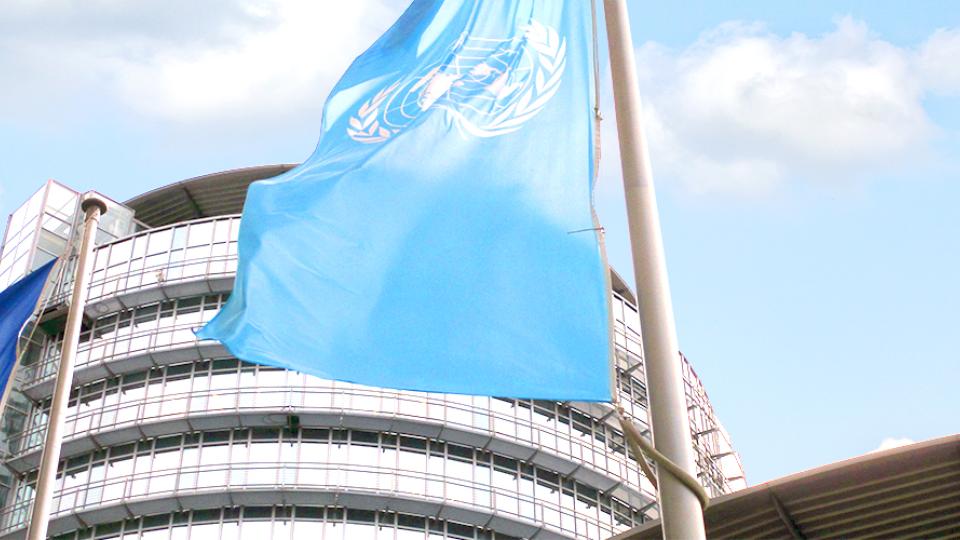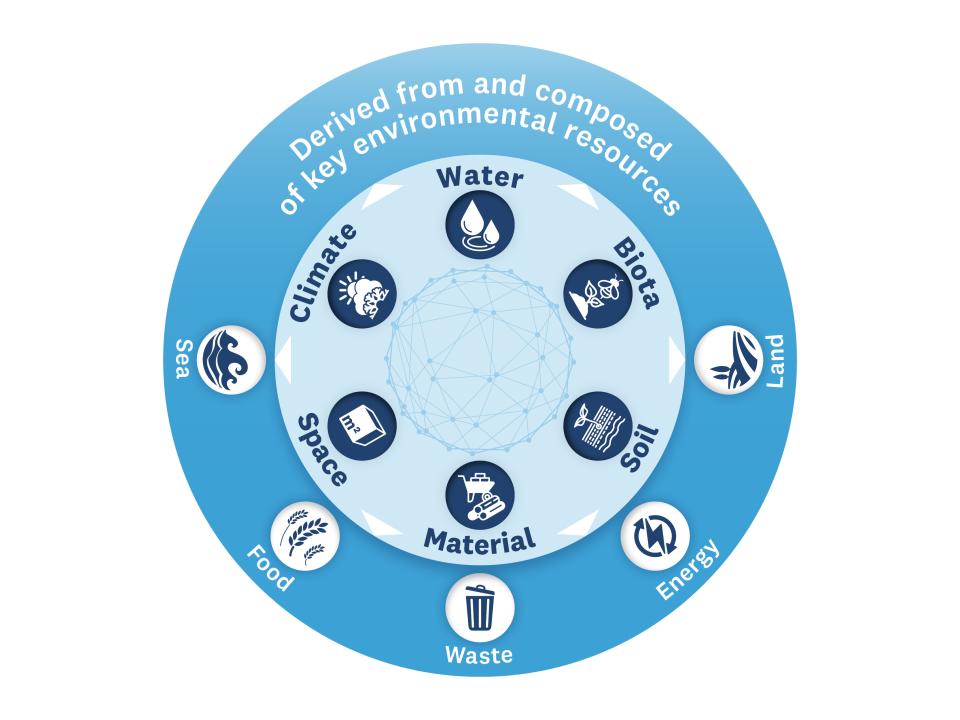Global Context
The degradation of natural resources represents one of the most critical environmental megatrends worldwide and is of great concern to the United Nations and its Member States. The 2030 Agenda for Sustainable Development reflects this concern in a wide range of indicators across all 17 Sustainable Development Goals (SDGs).
Challenges manifest themselves at different levels: e.g., at the local level, nutrients are crucial for soil and land-use management; at the regional level, the safe use of wastewater is key for delivering an appropriate water quantity and quality; and at the global level, climate change requires systems analysis to inform resource management decisions for energy and geo-resources. Focusing on the management of any single resource neglects the close intertwining and mutual dependencies of environmental resources, and thus results in “sectoral silo thinking”: ignoring trade-offs and potential synergies.
The vision and mission of UNU-FLORES, in conjunction with its core functions and key research areas, are adduced from this global context.
UNU-FLORES was established in Dresden, Germany in 2012 with the support of the Federal Ministry of Education and Research (BMBF) and the Ministry for Science, Culture and Tourism (SMWK) of the Free State of Saxony, Germany.
In 2021, UNU-FLORES established a branch office in Weisswasser to strengthen outreach efforts in Lusatia. UNU-FLORES also collaborates through hubs, which are partnerships with other institutes, to promote research, capacity-building, and outreach tackling global challenges and supporting UN priorities.

Organizational Pillars
The work of UNU-FLORES is anchored in four cross-cutting Pillars that provide a cohesive framework to support the Institute in advancing the Resource Nexus approach.
Research and Innovation Development
UNU-FLORES conducts rigorous, interdisciplinary scientific research grounded in the Resource Nexus approach. This research directly supports the United Nations Sustainable Development Goals (SDGs) by generating evidence that informs policy and practice. Research focuses on the advancement of the Resource Nexus approach, and methodologies for its implementation in different regions and contexts.
Education and Capacity Development
Under the umbrella of the Knowledge Academy of the Resource Nexus (KARE), UNU-FLORES delivers postgraduate education, advanced training programs, and capacity-building initiatives that strengthen the competencies of individuals and institutions (Learn, Apply, Engage). These efforts equip stakeholders with the expertise needed to make informed, evidence-based decisions, ensuring that Resource Nexus thinking is embedded in sustainable development planning, implementation, and monitoring.
Advocacy, Outreach, and Impact
Through a wide range of outreach initiatives and public engagement activities, the Institute strengthens connections with target audiences and the broader public. These efforts ensure that knowledge products, research findings, and institutional expertise inform policies, shape practices, and contribute to the intended impact.
Governance and Administration
UNU-FLORES’s governance structure and efficient administrative systems enable the Institute to fulfill its mandate effectively. Core functions such as Human Resources, Finance and Reporting, Administration and other operational services ensure transparency, accountability, and the smooth delivery of programs and institutional objectives.

An Institute of the United Nations University
UNU-FLORES is one of 14 institutes and programmes, located in 12 different countries, which together comprise the United Nations University (UNU)—a global think tank and postgraduate teaching organisation, headquartered in Tokyo.
The mission of UNU is to contribute, through collaborative research and education, to efforts to resolve the pressing global problems of human survival, development and welfare that are the concern of the United Nations, its Peoples and the Member States.
UNU and UNU-FLORES at a Glance
Organisational Structure
Organisations depend on various forms of capital, namely financial capital, manufactured capital, intellectual capital, human capital, social and relationship capital, and natural capital. These capitals are “stocks of value that are increased, decreased or transformed through the activities and outputs of the organization” (IIRC 2013). To comprehensively capture these “stocks of value”, institutional planning at UNU-FLORES follows this logic:
Financial Capital
UNU-FLORES strives to secure a healthy balance of diverse and long-term funds to ensure the sustainability of its operations. For topics related to the science-push strategy, (inter)national calls for submission of research proposals of donors are prospective sources of funding. Regarding topics related to the policy-pull strategy, decisionmakers and their respective funding mechanisms will be targeted. In following the Guidelines on Cooperation between the United Nations and the Business Sector, fundraising options with the business sector shall be explored. A rolling budget supports the agility required by a think tank.
Manufactured Capital
A floating office concept that allows for different working zones will not only encourage collaboration within UNU-FLORES but also result in a better-utilised office space; thus demonstrating higher resource efficiency, both economically and ecologically.
Intellectual Capital
To support research on the resource nexus and to allow an innovation culture, UNU-FLORES is organised into interdisciplinary resource nexus research programmes on integrated resources management. A reputation for academic excellence in the resource nexus research programmes will allow UNU-FLORES to implement a science-push strategy and ensure policy impact through subsequent advocacy-related activities. A flexible structure will foster this innovation culture.
Human Capital
Competency-based recruiting leads to securing the best minds for cutting-edge topics at the forefront of urgent global challenges, and support the think tank function of UNU-FLORES. Synergies with the strategic partner, TU Dresden, are leveraged. For younger scientists, the Institute’s membership to networks such as DRESDEN-concept e.V. opens the opportunity of being appointed a Young Investigator at TU Dresden, and the Visiting Scholar Programme serves as a catalyst for idea generation. A healthy work environment based on trust, transparency, tolerance of failure, and de-escalation, and in accordance with the UNU Policy on Gender Equality, shall guide decision making at UNU-FLORES. Flexible Working Arrangements support our staff members in balancing work life and private life.
Social and Relationship Capital
Relationships are key for the business model of UNU-FLORES. The Partnerships and Liaison function identifies and engages target audiences and/or clients at the outset of research projects – including private and business sectors. Collaboration within UNU-FLORES is supported by interdisciplinary Resource Nexus Research Programmes and a variety of academic incentives to develop connections – including an engaging Internship Programme and Visiting Scholar Programme. The Advisory Committee is a valuable source of advice on strategic and administrative questions alike. Collaboration within UNU shall be a core pillar for relationships. Collaboration within the UN System is key to operationalise the unique inclusivity of the scientific community. The strategic partnership and scientific collaboration between UNU-FLORES and TU Dresden have also led to an alignment with two local research networks that will prove crucial for joint research proposals PRISMA –Centre for Sustainability Assessment and DRESDEN-concept e.V., which represents nearly 30 research institutions across the Dresden area.
Natural Capital
As an institute with a focus on environmental resources, UNU-FLORES closely collaborates with the Greening the Blue initiative of SUN – Sustainable United Nations. UNU-FLORES also demonstrates its commitment to environmental awareness on an everyday office level, by implementing green procurement strategies and through the work of the Institute’s Green Committee. Increased recognition shall be given to energy and waste management, as well as to the impact of air travel in regard to climate change. Missions are completed by video conferences whenever possible, in keeping with the goal of functioning as a carbon-neutral and paperless institute.


